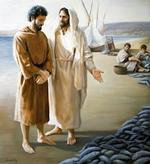Catholic World News News Feature
Pope challenges Venezuela's Chavez on Church role May 13, 2006
Pope Benedict XVI took an extraordinary step to challenge Venezuela's President Hugo Chavez during a May 11 meeting at the Vatican.
At the conclusion of a private conversation with the visiting Venezuelan leader, the Holy Father presented Chavez with a letter detailing the concerns of the Holy See regarding the condition of the Church in Venezuela.
Because Chavez has clashed frequently with the Venezuelan bishops, his visit to the Vatican was heavily anticipated. His private talk with the Pontiff was unusually long-- 35 minutes, as opposed to the 20 minutes that Pope Benedict usually allows for visitors-- and even the formal reception and exchange of gifts became the occasion for some political theater.
Chavez presented the Pope with a large portrait of Simon Bolivar, the hero of Venezuela's struggle for independence. Speaking at some length about his country's national hero, Chavez recalled that it was in Rome, at the age of 21, that Bolivar vowed to liberate South American from Spain. Chavez also insisted that, contrary to popular belief, Bolivar was not an atheist but a believing Catholic.
Pope Benedict responded quietly, giving Chavez the traditional medallions of the pontificate, a copy of his encyclical Deus Caritas Est, and a personal letter setting forth his concerns about Venezuela.
Papal spokesman Joaquin Navarro-Valls told reporters that the Pope had used the letter to emphasize the issues that he considers most critical, including:
- the freedom of the Holy See to nominate new bishops,
- the preservation of a distinctive Catholic identity at the Church-run University of Santa Rosa in Lima,
- the elimination of religious education from the school curriculum,
- the introduction of public-health programs that undermine the right to life, and
- the need for independence in the Catholic media
During his talk with the Pontiff, Chavez offered assurances that his government would work to ease the tensions that have characterized his relations with the Venezuelan bishops, Navarro-Valls reported. Chavez-- a former military officer who served two years in prison after a failed coup attempt in 1992-- came to power in 1998, winning the largest majority in 40 years of Venezuelan presidential contests. After being re-elected in 2000, in a vote that he demanded in order to consolidate his power, Chavez himself put down an attempted coup in 2002. In August 2004 he also survived a referendum aimed at removing him from office.
A self-styled socialist with ties to Cuba's Fidel Castro, Chavez has been charged with stifling political opposition in Venezuela. The country's bishops have been persistent critics, with Cardinal Rosalio Castillo Lara, the most outspoken prelate, referring to Chavez as a "paranoid dictator" who has crushed democracy in Venezuela.
Chavez in turn has referred to the critical bishops as "devils" and charged that the Catholic hierarchy is engaged in plotting against his government.






